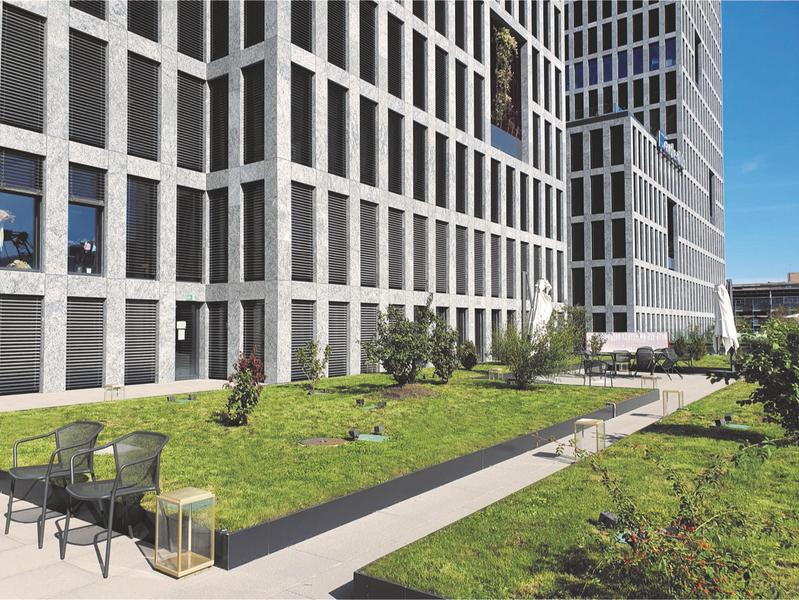How is CA next bank's Corporate Social Responsibility (CSR) approach structured?
CA next bank is a small Swiss bank that is part of a global mutualist group, Crédit Agricole. The Group's raison d'être is to act, every day, in the interests of its customers and society alike, and this must be translated into action. This is why, beyond our banking activity, we seek to give back what the bank can create to society and to the areas in which we operate.
What is the FReD approach, and what forms its three pillars?
FReD is the participatory and evolutionary approach upon which we base our strategy. It stands for Fides, Respect, and Demeter – the values that form our 3 CSR pillars.
- Fides refers to the goddess of good faith and honour in Roman mythology. This pillar corresponds to our core business and requires that we establish responsible relationships and act ethically in our operations (notably, in fighting fraud and preventing corruption).
- Respect is understood in the sense of respect for people and the areas in which we operate, with the role the company can play in the local fabric, in social support, and in the policies relating to its personnel.
- Demeter refers to the goddess of agriculture and harvest in Greek mythology. It represents our environmental pillar and our commitment to providing you with products and services that respect sustainability, and to controlling our direct carbon footprint.
How is Crédit Agricole next bank involved in sustainable development?
The Crédit Agricole Group is committed to achieving carbon neutrality by 2050. CA next bank is also part of this process, with the goal of meeting this objective more quickly, given our retail banking activity: since the bank is entirely dedicated to providing individuals with financial services, it is not concerned by activities linked to fossil fuels.
Before taking action, though, we need to know where we stand. This is why we commissioned two Swiss partners to help us measure our carbon footprint: Climate Services to measure the bank's own carbon footprint, and Wüest Partner to measure the footprint of our financing of residential properties.
Already over 15,000 customers have trusted us with financing their properties, the majority of which can still benefit from energy improvements. Part of our mission is therefore to support our clients in their plans to renovate.
In terms of the bank's footprint, the carbon emissions emitted in 2022 will represent 452 tCO2eq, or 2.2 tCO2eq per employee. In concrete terms, this places CA next bank in the average range of Swiss service companies (between 1.5 and 3 tCO2eq per employee).
What are the next steps following this analysis?
Carbon footprint of our mortgage portfolio
First and foremost, we encourage our customers to renovate their properties using our eco-financing offer, which enables them to enjoy a 0.20% reduction on all of our rates.
Crédit Agricole next bank CA next bank is also acting to create a virtuous circle: we are proud to be the first in the Group to have introduced refinancing solutions (Green Covered Bonds) which ensure that we focus on the most environmentally-friendly properties.
Bank-specific carbon footprint
The bank's main source of carbon emissions (37%) is the heating of our premises. Since 2018, our head office in Lancy Pont-Rouge (named "Evermint", a nod to the Crédit Agricole Group's "Evergreen" head office in Paris), has been exemplary in terms of eco-responsibility: it is certified with the DGNB eco-label, proof of good conduct in sustainable construction, and meets Minergie standards. There are, however, still agencies that are not up to standard. This has prompted us to have in-depth discussions with the property managers that host us about considerably reducing this impact in the near future.
Our employees' commutes account for 27% of our carbon emissions, the second largest contributor. Fully conscious of this, we have – since 2014 – been giving them an eco-mobility bonus based on their mode of travel between home and work to reward their efforts towards soft mobility. The above-mentioned study, however, has shown us that we need to go further in our efforts. Our goal is to quickly reach complete carbon neutrality with this type of commuting by supporting our employees with finding solutions adapted to their needs.
Lastly, our third-largest (16%) source of carbon emission comes from office automation and printing, specifically with regard to mail sent to clients. While our communications are already primarily digital, we are committed to further dematerialising all our communications with clients.
We have spoken extensively about mortgages. What about the investment solutions the bank offers?
In order to become a true actor for sustainable development, Crédit Agricole next bank has teamed up with leading European asset manager, Amundi, to offer its clients a range of responsible investment funds supporting the fight against climate change (Climate Bonds Euro) and the causes and challenges of the future (Global Disruptive Opportunities, Food for Generations, Global Silver Age).
What actions has Crédit Agricole taken for its clients and for the local communities in which it operates?
Today, commitment to the environment is crucial. This does not, however, mean that the importance of social commitment (our second FReD pillar: respect for people and the areas in which we operate) should be overlooked.
We want to maintain a long-term banking relationship with our customers to support them through the good times and the bad. At the height of the pandemic, for example, we temporarily suspended account maintenance fees for those who had lost their jobs. Another example: when necessary, we review mortgage files in order to find tailored solutions (such as payment deferrals).
At a societal level, we are committed to contributing to local social life. In 2022, CA next bank donated 1% of its profits, to the tune of CHF 100,000, to 8 organisations based in Switzerland. This was used to support those championing initiatives to help people in need, protect and restore the environment, and strengthen good relations with Europe.
Lastly, even as the world goes digital, we firmly believe that physical spaces continue to be an important element in our relationship with clients. This is why, bucking the current trend of branch closures, we have decided to invest, banking on human values and transforming our branches into modern, friendly spaces, conducive to dialogue and to offering advice.
How is this human dimension reflected within the bank?
For us, it is important to work to ensure equity and promote diversity within the bank with a modern and progressive personnel policy.
In 2021, we earned the Fair-ON-Pay certification, which attests that CA next bank respects equal pay for women and men, and recognises our long-standing policy of responsible and fair pay. In addition to this, we invest over 1.5% of the total value of our payroll in employee training every year.
In January 2023, CA next bank became "Great Place to Work"-certified; this recognises our various initiatives and gives additional legitimacy to our human resources policy. During the anonymous survey, our employees praised the favourable working environment, friendly team spirit, and inclusive behaviour.
Based on our values of responsibility and solidarity, we have established a three-year partnership with the OTIUM Foundation. Through this association, our employees affected by cancer can seek help for themselves or for their loved ones. Indeed, cancer is the leading cause of premature death in Switzerland and over one person in five develops it before 70 years of age. It is unfortunately common to know someone in one's entourage who is affected by the disease and we would like to offer our support to those concerned.
Related articles

1% of our profits dedicated to supporting 10 social initiatives
Published on February 6, 2024
Reading time 5 min.Crédit Agricole next bank is continuing its CSR approach, and this year is allocating 1% of its 2023 profits – i.e. a total of CHF 104,000 – to supporting 10 organisations, all of which were submitted by the Bank's employees as part of an internal programme.

Bringing smiles back to the faces of children in hospital with...
Published on December 14, 2023
Reading time 5 min.With the festive season fast approaching, Crédit Agricole next bank and its employees decided to support Fondation Théodora for the second year running.

Crédit Agricole next bank gets its Christmas trees from Ecosapin
Published on November 30, 2023
Reading time 2 min.Keen to bring some magic to its premises for the festive season while reinforcing its commitment to the environment, Crédit Agricole next bank has opted this year to hire potted Christmas trees that can be returned to nature in January.
